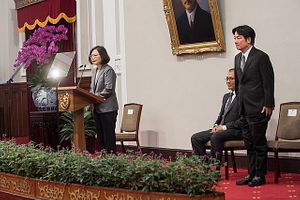Earlier this week the administration of President Tsai Ing-wen in Taiwan changed premiers. Premiers in Taiwan come and go like dresses on Kardashians, yet from the breathless commentary in the international media, one would think that Taiwan had tested a hydrogen bomb.
AP worried: “Taiwan’s premier tendered his resignation on Monday, raising the possibility of changes in the island’s troubled relationship with mainland China.” Another piece from AP again summoned the China spectre: ‘Taiwan’s president on Tuesday appointed a new premier seen as willing to reach out to rival China amid ongoing tense relations between the two sides.” Bloomberg actually got it right in the first half of its report, but then helplessly called in China tensions at the end, lest the public imagine that something can happen in Taiwan yet have nothing to do with China, which is obviously impossible.
The simple truth is that the appointment of the new premier, William Lai, will have no effect on the island’s relations with China and foreign policy played no part in his appointment. In Taiwan’s weird semi-presidential system (the legislature can recall the premier but the President can then dismiss the legislature, neither event ever occurs) the Premier is responsible for overseeing the executive agencies and implementing domestic policy.
With a major local election inbound in 2018, many observers have argued that President Tsai of the pro-Taiwan Democratic Progressive Party (DPP) will remove the uninspiring technocrats who populated her first cabinet and replace them with politicians who know how to get things done and also connect with voters. The new premier, the popular and energetic mayor of the southern city of Tainan, a hotbed of Taiwan nationalism, is such a person. The first cabinet was thus no more than a “suicide squad” designed to serve as a transitional cabinet until the real politicians were brought in, doomed irrespective of Tsai’s alleged popularity in the polls.
Observers have speculated that Lai will run for mayor of New Taipei City, the island’s most populous municipality, located in the north. Bringing Lai out of the south gives him exposure to voters in the north, and removes him from his post in Tainan, saving the DPP the embarrassment of having the mayor of one city campaigning for the mayorship of another in 2018, should the party decide to run Lai for the position. Lai has also been mentioned as a possible successor to Tsai one day, so the new post will give him central government experience as well as provide a test of his abilities.
Since Lai’s possible ascension to the premiership and presidency has been the subject of much discussion in local media since Tsai’s election in 2016 (and long before), it is hard to imagine how the international media could create an international political context for it. Indeed, both AP articles and a similarly misguided Reuters piece failed to alert their readers to the fact that Lai is a rising figure. To its credit, Bloomberg got that right.
In addition to the ZOMG CHINA! context, another clickbait chestnut on display in these articles is their framing of Tsai’s approval ratings. Like an Escher drawing, in the media her ratings are always falling, yet never landing. In reality, her approval quickly fell from 70 percent to 34.9 percent by late October of 2016 and has bounced around the 30s ever since. A similar decline happened to the previous president, Ma Ying-jeou, yet he was re-elected in 2012 with approval ratings in the 20s. This pattern is structural and related to Tsai’s domestic policies and Taiwan’s identity politics, not her foreign policy as the AP pieces falsely implied. Polls from earlier this year, such as this one in May and this one from this week, show that her policies have strong support, including her rejection of Beijing’s “one China” claim over Taiwan. Despite this, AP used the term “plummet” to describe popularity that was 34.9 percent in October of last year and is now at 33 percent.
The international media’s “concern” over the appointment of Lai is a stellar example of its flagrant double standard on Taiwan’s politics. Six premiers came and went under the previous pro-China president, without negative comment on cross-strait relations in the international media. Similarly, one never reads: “scores of civilian aircraft disgorging thousands of businessmen and tourists criss-crossed the Taiwan Strait today amid ongoing tense relations.” Only the actions of the pro-Taiwan DPP are incessantly and negatively contextualized as occurring “amid tensions” or as having some (potentially destabilizing) effect on cross-strait relations, while the DPP chief executive is perpetually in a state of near-crisis.
More than just a maddeningly distorted and misleading view of Taiwan, it truly is a sad commentary — not on Taiwan’s vibrant democracy, but on the inability of so many in the international media to come to terms with the island’s democracy and Beijing’s threat to it.
Michael Turton blogs on Taiwan politics and history at The View from Taiwan.
































